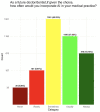Artificial Intelligence in Medicine: A Multinational Multi-Center Survey on the Medical and Dental Students' Perception
- PMID: 35004598
- PMCID: PMC8739771
- DOI: 10.3389/fpubh.2021.795284
Artificial Intelligence in Medicine: A Multinational Multi-Center Survey on the Medical and Dental Students' Perception
Abstract
Background: The emerging field of artificial intelligence (AI) will probably affect the practice for the next generation of doctors. However, the students' views on AI have not been largely investigated. Methods: An anonymous electronic survey on AI was designed for medical and dental students to explore: (1) sources of information about AI, (2) AI applications and concerns, (3) AI status as a topic in medicine, and (4) students' feelings and attitudes. The questionnaire was advertised on social media platforms in 2020. Security measures were employed to prevent fraudulent responses. Mann-Whitney U-test was employed for all comparisons. A sensitivity analysis was also performed by binarizing responses to express disagreement and agreement using the Chi-squared test. Results: Three thousand one hundred thirty-three respondents from 63 countries from all continents were included. Most respondents reported having at least a moderate understanding of the technologies underpinning AI and of their current application, with higher agreement associated with being male (p < 0.0001), tech-savvy (p < 0.0001), pre-clinical student (p < 0.006), and from a developed country (p < 0.04). Students perceive AI as a partner rather than a competitor (72.2%) with a higher agreement for medical students (p = 0.002). The belief that AI will revolutionize medicine and dentistry (83.9%) with greater agreement for students from a developed country (p = 0.0004) was noted. Most students agree that the AI developments will make medicine and dentistry more exciting (69.9%), that AI shall be part of the medical training (85.6%) and they are eager to incorporate AI in their future practice (99%). Conclusion: Currently, AI is a hot topic in medicine and dentistry. Students have a basic understanding of AI principles, a positive attitude toward AI and would like to have it incorporated into their training.
Keywords: artificial intelligence; dental students; medical students; medicine; survey.
Copyright © 2021 Bisdas, Topriceanu, Zakrzewska, Irimia, Shakallis, Subhash, Casapu, Leon-Rojas, Pinto dos Santos, Andrews, Zeicu, Bouhuwaish, Lestari, Abu-Ismail, Sadiq, Khamees, Mohammed, Williams, Omran, Ismail and Ebrahim.
Conflict of interest statement
The authors declare that the research was conducted in the absence of any commercial or financial relationships that could be construed as a potential conflict of interest.
Figures
References
-
- Taulli T. Artificial Intelligence Basics: A Non-Technical Introduction. 1 ed. Berkeley, CA: Apress; (2019). 10.1007/978-1-4842-5028-0_1 - DOI
Publication types
MeSH terms
LinkOut - more resources
Full Text Sources


